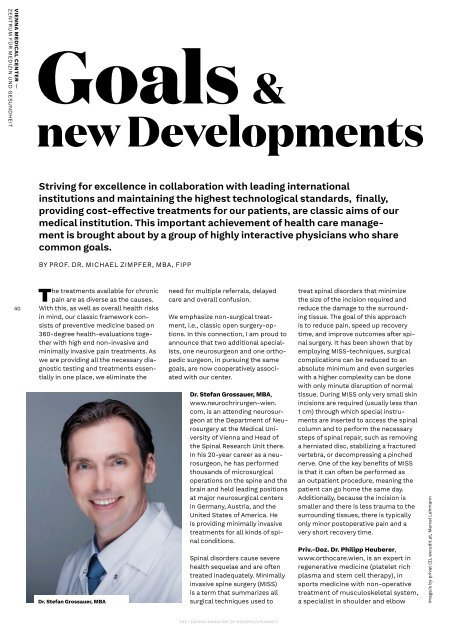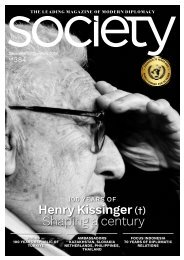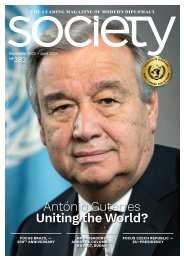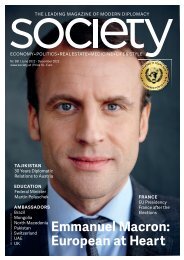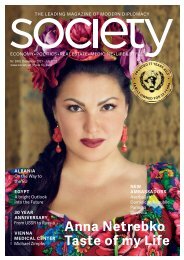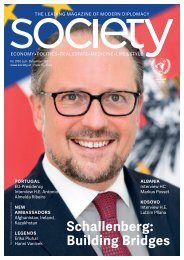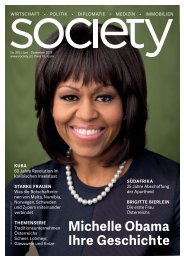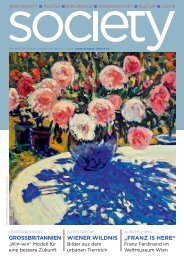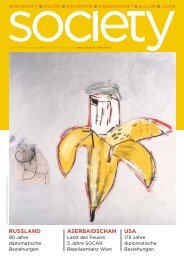SOCIETY 383
The summer issue of SOCIETY features the countries Sweden and Armenia, as well as interviews with the Ambassadors of China, Cyprus, Japan, Lithuania, Korea and Switzerland and Turkmenistan. You will also find an article by Christian Wehrschütz on the parliamentary elections in Montenegro as well as travel stories on Provence in the south of France.
The summer issue of SOCIETY features the countries Sweden and Armenia, as well as interviews with the Ambassadors of China, Cyprus, Japan, Lithuania, Korea and Switzerland and Turkmenistan. You will also find an article by Christian Wehrschütz on the parliamentary elections in Montenegro as well as travel stories on Provence in the south of France.
Create successful ePaper yourself
Turn your PDF publications into a flip-book with our unique Google optimized e-Paper software.
VIENNA MEDICAL CENTER —<br />
ZENTRUM FÜR MEDIZIN UND GESUNDHEIT<br />
Goals &<br />
new Developments<br />
Striving for excellence in collaboration with leading international<br />
insti tutions and maintaining the highest technological standards, finally,<br />
providing cost-effective treatments for our patients, are classic aims of our<br />
medical institution. This important achievement of health care management<br />
is brought about by a group of highly interactive physicians who share<br />
common goals.<br />
BY PROF. DR. MICHAEL ZIMPFER, MBA, FIPP<br />
40<br />
T<br />
he treatments available for chronic<br />
pain are as diverse as the causes.<br />
With this, as well as overall health risks<br />
in mind, our classic framework consists<br />
of preventive medicine based on<br />
360-degree health-evaluations together<br />
with high end non-invasive and<br />
minimally invasive pain treatments. As<br />
we are providing all the necessary diagnostic<br />
testing and treatments essentially<br />
in one place, we eliminate the<br />
Dr. Stefan Grossauer, MBA<br />
need for multiple referrals, delayed<br />
care and overall confusion.<br />
We emphasize non-surgical treatment,<br />
i.e., classic open surgery-options.<br />
In this connection, I am proud to<br />
announce that two additional specialists,<br />
one neurosurgeon and one orthopedic<br />
surgeon, in pursuing the same<br />
goals, are now cooperatively associated<br />
with our center.<br />
Dr. Stefan Grossauer, MBA,<br />
www.neurochrirurgen-wien.<br />
com, is an attending neurosurgeon<br />
at the Department of Neurosurgery<br />
at the Medical University<br />
of Vienna and Head of<br />
the Spinal Research Unit there.<br />
In his 20-year career as a neurosurgeon,<br />
he has performed<br />
thousands of microsurgical<br />
operations on the spine and the<br />
brain and held leading positions<br />
at major neurosurgical centers<br />
in Germany, Austria, and the<br />
United States of America. He<br />
is providing minimally invasive<br />
treatments for all kinds of spinal<br />
conditions.<br />
Spinal disorders cause severe<br />
health sequelae and are often<br />
treated inadequately. Minimally<br />
invasive spine surgery (MISS)<br />
is a term that summarizes all<br />
surgical techniques used to<br />
treat spinal disorders that minimize<br />
the size of the incision required and<br />
reduce the damage to the surrounding<br />
tissue. The goal of this approach<br />
is to reduce pain, speed up recovery<br />
time, and improve outcomes after spinal<br />
surgery. It has been shown that by<br />
employing MISS-techniques, surgical<br />
complications can be reduced to an<br />
absolute minimum and even surgeries<br />
with a higher complexity can be done<br />
with only minute disruption of normal<br />
tissue. During MISS only very small skin<br />
incisions are required (usually less than<br />
1 cm) through which special instruments<br />
are inserted to access the spinal<br />
column and to perform the necessary<br />
steps of spinal repair, such as removing<br />
a herniated disc, stabilizing a fractured<br />
vertebra, or decompressing a pinched<br />
nerve. One of the key benefits of MISS<br />
is that it can often be performed as<br />
an outpatient procedure, meaning the<br />
patient can go home the same day.<br />
Additionally, because the incision is<br />
smaller and there is less trauma to the<br />
surrounding tissues, there is typically<br />
only minor postoperative pain and a<br />
very short recovery time.<br />
Priv.-Doz. Dr. Philipp Heuberer,<br />
www.orthocare.wien, is an expert in<br />
regenerative medicine (platelet rich<br />
plasma and stem cell therapy), in<br />
sports medicine with non-operative<br />
treatment of musculoskeletal system,<br />
a specialist in shoulder and elbow<br />
image/s by privat (2), excudit.at, Marcel Lehmann<br />
THE LEADING MAGAZINE OF MODERN DIPLOMACY


